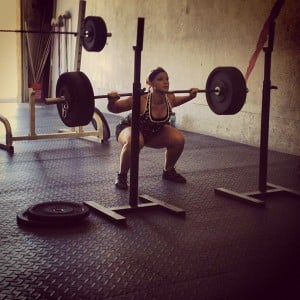On a recent visit to my middle daughter (note to self, and parents with three or more children: we MUST find a better term for “middle child”), I was convinced to join her, and a group of ridiculously fit others, at the local CrossFit Gym.

CrossFit– a strength and conditioning program that is remarkably suited to individual tailoring — is a bit controversial, simply because its members are serious about their workouts. They lift extremely heavy weights. They do an insane number of push ups. Unsatisfied with the average pull-up, of which many people, like me, cannot do even one, they create variations, many of which leave you, mouth agape, with the thought, “Are you kidding?”
They push themselves and their bodies beyond what their minds think they can do, and therein lies the controversy:
“It’s too hard.”
“This demands too much.”
“The average person can’t do this.”
As an average person who has survived the experience not only once, but three times (weird, I know — I kept going back for more), I can assure you that yes, it is hard, and yes, it demands a lot, but also yes, it can be done — because the workouts are scaled — read, adjusted — to the ability of the person doing them.
So, while some people in the room are jumping up on, and down from, a two-foot wooden box, I chose to step up, one foot at a time, and down, for the 21, 15, and 9 scheduled repetitions. And while this was laughably easy for my daughter, it was perfectly tailored to me.
When it was time to lift a bar, with weights — 21, 15, and 9 times — I was fine with 11 pounds and figuring out proper form. In front of me, the Middle Daughter was lifting 90? 100? 110? The man in front of her had even more weights on the bar; the man behind me had less.
Tailored to Our Abilities
We all did what we felt we could do, pushing ourselves as hard as we could without “failing,” as the coaches phrase it, and everyone was so focused on getting through the workout, alive, that no one had time to watch, and judge or envy, those around them.

I don’t think I can overemphasize the, “tailored to one’s ability,” part — an option that is structured and customized by the individual doing the workout, in conjunction with advice from the coach. This coach knows the people in the class, and his or her goal is to encourage each participant to work as hard as they can, without being ridiculous about it.
“My sheep listen to my voice; I know them, and they follow me,” Jesus, who could be called the ultimate CrossFit coach, says in John 10:27.
“Come to me, all you who are weary and burdened, and I will give you rest,” He says in Matthew 11:28-30. “Take my yoke upon you and learn from me, for I am gentle and humble in heart, and you will find rest for your souls. For my yoke is easy and my burden is light.”
For all that the yoke is easy, and its burden light, it’s still got some weight to it, which is something we forget about when we walk as Christians: when things get difficult, when we find ourselves breathing heavily, when we can’t possibly keep going because “it’s too hard,” “it demands too much,” and “the average person can’t do this,” we say it’s because we don’t have enough faith, when really, we could very well be in the midst of a high-intensity workout, one tailored to our abilities, and one that will cause us to emerge stronger than we were before.
Life Is a Workout for Everyone
Rather than put ourselves down because our life isn’t running smoothly while everyone else’s appears to be doing so, we can,
“rejoice in our sufferings, because we know that suffering produces perseverance; perseverance, character; and character hope,” (Romans 5:5) much in the same way that lifting weights builds muscles, and running and jumping enhance aerobic endurance.
Now like most human beings, I don’t particularly jump up and down with joy over the high anxiety, stress-inducing circumstances that insert themselves into all of our lives, but the apostle Peter tells us in 1 Peter 4:12,
“Dear friends, do not be surprised at the painful trial you are suffering, as though something strange were happening to you. But rejoice (there’s that word again) that you participate in the sufferings of Christ, so that you may be overjoyed when his glory is revealed.”
Life happens, to all of us. Sometimes it feels like there’s too much weight on the bar, but,
“God is faithful; he will not let you be tempted beyond what you can bear.” (1 Corinthians 10:13). This verse is not meant to alarm us, because God is tossing bad things our way, but to relieve us from the fear that we will fail because the weight is too heavy, and result in our hurting ourselves. If need be, He’ll act as spotter from behind, and take some of that weight off.
Off the Sofa, Away from the Chips
In 2 Peter 1:5-8, the apostle encourages us to,
“make every effort to add to your faith goodness; and to goodness, knowledge; and to knowledge, self-control; and to self-control, perseverance; and to perseverance, godliness; and to godliness, brotherly kindness, and to brotherly kindness, love. For if you possess these qualities in increasing measure, they will keep you from being ineffective and unproductive in your knowledge of the Lord Jesus Christ.”
Ineffective, unproductive, and weak — that’s what our bodies become when we sit in a chair all day and eat chips. And that’s what our spiritual life could look like if we never had any problems, but life doesn’t let us get away with that option.
We all have problems. We all have concerns. We all have worries and sorrows and pain and suffering — but we also have the ultimate CrossFit coach — He will not lead us to failure.
Thank You
Thank you for joining me at Commonsense Christianity, where, though I am not continuing CrossFit, I have created my own version of Cross Pilates, and push myself in my own insane manner in the comfort of my bedroom.
And every day, in life, I keep moving, pushing, jumping, leaping, stretching, trying, and resting in God, as I grow in wisdom and grace. May you, my friend, do likewise as well.
Posts complementing this one are
Yes or No: Does God Hear Our Prayers?
Negative Thoughts: Deny the Lie

